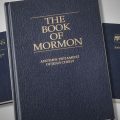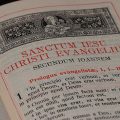Question
Dear Gramps,
What do you know about the Adamic language? Is it the same as Hebrew? I have Jewish friends who say they are one and the same, but I thought the Adamic language was no longer on earth today. I’m interested in your thoughts. Thank you!
Carrie
Answer
Carrie,
No, they’re not. But there is a reason why some Jewish converts might think so. Only a few passages or phrases of the “Pure Language” (or Adamic as it is commonly known) have actually been revealed. And even then, we’re not certain if they are really Adamic or not. Many equate the Adamic language with the language of celestial beings. According to Dieter F. Uchtdorf, that is German. I’m not sure if that constitutes a First Presidency statement.
We use the term “Adam-ondi-Ahman”. This phrase is probably the most common that we speak of in our faith. While it has varied translations into English, it is supposed to be from the Pure Language. However, the name “Adam” is of Hebrew origin. It is nothing unearthly.
Ahman could be construed to be some transliteration of the term for “I Am” which was the name of God in Hebrew. It is a stretch to make it so. But sometimes words take strange twists when moving from one tongue to another. Hugh Nibley, on the other hand, equated it to the Egyptian “Amon” (sometimes transliterated as “Amun”) who was the original god of the Egyptian pantheon (Father of the gods and creator of all things). Elder McConkie noted that the term is similar to the less common pronunciation of “Amen” which is of ancient origin as well. But this means that we have earthly origins for these terms. Note that they are not simply Hebrew, but of multiple languages.
We don’t know where “ondi” comes from. And it is this word that varies in translation. It could very well be that this word is Adamic. However, much of what we do know seems to be more of the grammar rather than the vocabulary.
For example:
Q What is the name of God in pure Language
A Awmen. [Ahman]
Q The meaning of the pure word Awmen
A It is the being which made all things in all its parts.
Q What is the name of the Son of God.
A The Son Awmen.
Q What is the Son Awmen.
A It is the greatest of all the parts of Awmen which is the Godhead the first born.
Q What is man.
A This signifies Sons Awmen. the human family the children of men the greatest parts of Awmen Sons the Son Awmen
Q What are Angels called in pure language.
A Awmen Angls-men [usually standardized as Ahman Anglo-men]
Q What are the meaning of these words.
A Awmen’s Ministerring servants Sanctified who are sent forth from heaven to minister for or to Sons Awmen the greatest part of Awmen Son. Sons Awmen Son Awmen Awmen
— Sample of Pure Language, March 1832 given by Joseph the Seer as copied by Br Johnson.
Looking at this we realize that the word “Son”, “men”, and “Angls” or “Anglo” are really English words (or of the languages that form the roots of English). So, this does not appear to be the vocabulary of the Pure Language, but rather the grammar and structure of the language. I know of no Hebrew term for “Angel” that is pronounced in any manner similar to Angls or Anglo.
Elder Bruce R. McConkie also had this to say:
“This first language spoken by mortals was either the celestial tongue of the Gods or such adaptation of it as was necessary to meet the limitations of mortality; and Adam and his posterity had power to speak, read, and write it. In writing of the saints in the day of the first man, Moses says: ‘And a book of remembrance was kept, in the language of Adam, for it was given unto as many as called upon God to write by the spirit of inspiration; And by them their children were taught to read and write, having a language which was pure and undefiled.’ (Moses 6:5-6.) The beauty and power of this Adamic language is indicated by a statement made by Moroni to the Lord about the Brother of Jared (who spoke the original and pure language): ‘Thou madest him that the things which he wrote were mighty even as thou art unto the overpowering of man to read them.’” (Ether 12:24.)
So, just what do we know of the Pure Language? Not much. Part of this may be that Adamic is not just a language of the tongue, but of the soul as well. Many speculate that the Pure Language is that of music and that is why the Heavenly Hosts sing praises to the Lord. While this does much to inspire and gain more out of singing our hymns, it is really speculation to talk about what it really is.
I’m sorry I couldn’t definitively answer the question. But sometimes the real and correct answer is “I don’t know.”
Gramps







